By: Mitchell Abbott
Windows 10 Support Is Ending – Here’s What You Need to Know!
Microsoft will officially end support for Windows 10 on October 14th, 2025.
Why Is This Happening?
When Windows 10 was released on July 29th, 2015, Microsoft committed to 10 years of product
support. As we approach that milestone, Microsoft is investing in Windows 11, their latest OS yet,
featuring robust security and AI integrations.
What This Means for You:
After October 14, 2025, Windows 10 will no longer receive security updates. While your PC may
continue to function, it will become increasingly vulnerable to security threats over time.
To stay protected, it’s important to upgrade to a supported operating system—whether that
means transitioning to Windows 11 or selecting an alternative platform such as MacOS or Linux,
upgrading to a supported system ensures your device remains secure, reliable, and equipped to
meet modern security threats with confidence.
Looking Ahead with Confidence.
Technology is always evolving, and transitions like this one offer a chance to refresh, improve, and
rethink how we use our devices. Whether you’re upgrading, replacing, or exploring new solutions,
the end of Windows 10 support doesn’t have to be stressful.
Comprenew is here to help you make the most of this shift—securely, affordably, and
sustainably.
What’s new with Windows 11?
AI-Powered Features
• Microsoft Copilot: Your AI assistant for writing, summarizing, coding, and more.
• Smart App Control: Blocks untrusted apps from running
Productivity Enhancements
• Snap Layouts & Desktops: Organize windows precisely; save desktop setups
• File Explorer Tabs & Smart Recommendations: Easier access to your files
• Snipping Tool with Text Recognition: Copy/edit text from screenshots cleanly
• Phone Link for iPhone: Manage texts, calls, and notifications via PC
Creative Tools
• Generative Erase & Image Creator: AI-powered photo editing and creation
• Layer-Support in Paint & Photos: Enhanced editing flexibility
Beefed-Up Security
• Passkey Support via Windows Hello: Easier and safer login
• Wake on Approach / Lock on Leave: Automatically secures when away
Gaming & Connectivity Upgrades
• DirectStorage & Auto HDR: Faster load times and richer visuals for gamers
• Wi-Fi 7 Support: Supercharged networking speeds and reliability
Windows 11 Hardware Requirements
To install Windows 11, your device must meet these minimum specs:
• Processor: 8th Gen Intel CPU or newer (1 GHz+, 2+ cores, on approved CPU list)
• RAM: 4 GB or more (8GB for optimal experience)
• Storage: 64 GB or larger (SSD or better for OS Install Drive)
• System Firmware: UEFI, Secure Boot, and TPM 2.0
• Internet Connection: Required for setup for Windows 11 Home and Pro accounts.
What Are Your Options?
Comprenew is here to help you navigate the transition. Here are your main options:
1. Buy a Professionally Refurbished Device
Comprenew offers certified, professionally refurbished PCs at a fraction of the cost of
buying brand new – backed by our rugged certification profile and genuine Windows 11
licenses!
Benefits:
• Significant Cost Savings
• Business-grade durability and performance
• Includes a genuine activated Microsoft authorized Windows 11 license.
• Environmentally responsible
Best for: Budget conscious users, schools, nonprofits and businesses seeking
reliable systems for personal, office, or hybrid use cases.
Comprenew Advantage: As a Microsoft Authorized Refurbisher we ensure every
device is secure, fully updated, and ready to perform on Day 1!
Every device undergoes rigorous functionality testing and comes equipped with
genuine Microsoft software. Each unit includes a comprehensive specification
tag, giving you complete transparency into its features and performance.
To give you added peace of mind, all devices come backed by a 1-year warranty, a
guarantee of our confidence in the products we provide.
Our commitment to service doesn’t end at the point of sale. Comprenew’s
experienced technicians offer comprehensive support, from initial setup to
personalized assistance tailored to your unique needs.
With Comprenew, you’re not just purchasing a device—you’re partnering with a
team committed to delivering secure, dependable technology, exceptional service,
and a shared mission to protect the environment. Every refurbished device helps
reduce electronic waste and supports a more sustainable future.
2.Upgrade Your Existing PC to Windows 11
If your system meets all requirements, you can upgrade to Windows 11 for free!
Benefits:
• No cost if eligible
• Keeps your current setup and software
• Familiar hardware and workflow
Best for: Tech-savvy users with compatible systems who want to avoid new hardware costs.
Not sure if your device is eligible? Let Comprenew assess your system!
Upgrading from Windows 10 to Windows 11 doesn’t have to be complicated or costly! For most compatible devices, the upgrade is completely free.
By choosing Comprenew to assist with your upgrade, you gain access to a team of expert
technical support professionals who ensure your system is ready, secure, and optimized
for the latest features Windows 11 has to offer.
Our technicians can guide you through every step of the process, including device
compatibility assessments, data backups, installation, and post-upgrade
configuration.
This not only saves you time and frustration but also extends the life of your current device –
delivering significant cost savings compared to purchasing new hardware.
With Comprenews commitment to sustainability, upgrading your existing device also helps
reduce e-waste and supports a more environmentally responsible future.
3. Switch to Another OS
If upgrading to Windows 11 isn’t an option, there are several reliable alternatives that can extend the life of
your device and help you avoid the cost of purchasing new hardware. Depending on your needs, you may
benefit from exploring open-source operating systems or considering a shift to MacOS.
One of the most popular open-source alternatives is Linux, which is free to use and supported by a global
development community. Known for its security, stability, and flexibility, Linux is a strong option for users
looking to maximize performance on older hardware. Distributions like Ubuntu, Linux Mint, Bazzite, and
Manjaro are especially user-friendly, offering a familiar interface and built-in tools for web browsing, email,
document editing, and more.
For those already invested in Apple products or seeking a highly polished and intuitive experience, MacOS is
another powerful alternative. It offers seamless software integration, strong privacy controls, and a well supported ecosystem ideal for both personal and professional use. While it requires Apple hardware, MacOS
is often favored for its ease of use and long-term reliability.
Each of these platforms has its own advantages, and Comprenew can help you evaluate the best fit based on
your intended use case, comfort level, hardware capabilities, and long-term goals—whether you’re looking
for basic web access, gaming, office productivity, multimedia use, or a more specialized application. Talk to a
Comprenew technician today to explore which operating system is best suited to you. We’re here to help you
make a confident, informed decision.
Benefits:
• Open-Source Operating Systems are completely free
• Open-Source Operating Systems are Secure and fast (especially on older hardware)
• MacOS features a user-friendly interface and is designed for seamless integration into the
Apple ecosystem
Considerations:
• Not all Windows programs are compatible
• Steep learning curve for new users
• May not be ideal for specialized business software or gaming
Best for: Light users, developers, and tech explorers willing to learn something new
4. Buy a New Device
If you’re looking for top performance, long-term support, and the latest hardware features,
purchasing a new computer is the most future-proof option.
Benefits:
• Built for Full Compatibility
• Designed to receive Windows updates and security patches well into the future,
ensuring long-term viability
• Guaranteed compatibility with advanced features (like AI Copilot, DirectStorage,
and enhanced hardware-based security)
• Often includes cutting edge ports and connectivity (USB 3.4, Wi-Fi 7, Bluetooth
5.4)
Best for: Users in mission-critical environments or those who require the latest advancements in
performance, security, and functionality, including support for AI-driven tools, advanced
graphics processing, enhanced hardware based security, and emerging technologies
designed to optimize productivity and workflow efficiency.
Downsides:
• Most expensive option
• May include unnecessary bloatware and 3rd party software on consumer-grade
models
• May require additional setup to transfer data from old systems
While Comprenew may not consistently carry brand-new devices, our team is here to help
you make informed decisions about your next steps. We’re fully equipped to diagnose,
repair, and support next generation hardware, ensuring you continue to receive expert
guidance and reliable service, no matter where your technology journey takes you.
5. Extend Windows 10 with Microsoft’s Extended Security Updates (ESUs)
If none of the above options are viable, Microsoft offers a last-resort option to buy Extended
Security Updates.
Key Info:
• Cost: $30 per device (for one year)
• Only available from Microsoft and enrolled resellers
• Does not include new features—only security patches
• Available to individual users for the first time (previously only available for
enterprise)
Best for: Short-term use in business or nonprofit environments while transitioning to a longer-term
solution.
Caution: This is a temporary stopgap, not a long-term fix.
Cost Comparison Guide
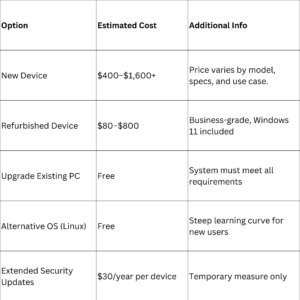
FAQs:
Q: Can I still upgrade to Windows 11 for free? How long do I have to upgrade?
A: Yes! Microsoft has not set an expiration date for the free W11 upgrade (as of now).
Q: Will Windows 10 still work after October 14th, 2025?
A: Yes, but it will no longer receive security updates. We strongly discourage using
Windows 10 online past this date.
Q: Will Microsoft 365 apps still work on Windows 10?
A: They will function but will no longer be supported after Oct. 14th, 2025. You may
experience bugs, performance issues, or security vulnerabilities.
Q: Will other apps still work on Windows 10?
A: Yes, initially. But many software developers will stop supporting Windows 10 soon after
Microsoft ends support.
Q: Will my Windows 10 programs work on Windows 11?
A: Most applications will work. In rare cases, they may require “compatibility mode”
settings.
Need Help? Contact Comprenew!
Not sure which path is right for you? Comprenew is here to help. Whether you’re an
individual, business, or nonprofit, we offer personalized support to guide you through the
Windows 10 transition with clarity and confidence.
We can help you:
• Evaluate your current hardware for Windows 11 compatibility
• Compare upgrade vs. replacement costs
• Explore secure, budget-friendly refurbished systems
• Install and configure Linux on compatible devices
• Understand Microsoft’s Extended Security Updates (ESUs)
• Identify the best option based on your needs and goals
Let’s keep your technology secure, reliable, and ready for a sustainable digital future.
From computers and tablets to smartphones and more, technology is a part of our everyday lives — there’s no getting around it.
Unfortunately, our increasing use of electronics is having a serious impact on our environment in the form of using up rare minerals, air and water pollution, high energy consumption, and landfills full of e-waste.
But there are ways to get the technology we need more sustainably — the easiest of which is to buy refurbished electronics. Refurbished smartphones, computers, and other devices allow us to continue using the technology we have become accustomed to while significantly lowering its environmental impact.
Reduces Our Reliance on Core Minerals and Plastics
 The electronics we use every day require materials like gold, silver, silicon, lithium, and many more metals and rare earth elements, which all need to be mined from the earth. Some of these materials are in short supply, such as cobalt (used in lithium batteries), of which there is an estimated 40-year supply left. Needless to say, the mining of these materials has a huge negative impact on the environment.
The electronics we use every day require materials like gold, silver, silicon, lithium, and many more metals and rare earth elements, which all need to be mined from the earth. Some of these materials are in short supply, such as cobalt (used in lithium batteries), of which there is an estimated 40-year supply left. Needless to say, the mining of these materials has a huge negative impact on the environment.
In addition, manufacturing smartphones, computers, and other electronics uses huge amounts of plastic, which is often mixed with chemicals that make it only partially recyclable.
Refurbished devices reuse parts that have already been manufactured, reducing the need for additional core minerals and plastics.
Creates Less Air and Water Pollution
 The mining of core minerals alone produces a significant amount of water pollution. The manufacturing process sends a ton of pollution into our air and water as well. In addition, many of the components used to make computers and other electronics are toxic, leading to polluted soil and water when they sit in a landfill.
The mining of core minerals alone produces a significant amount of water pollution. The manufacturing process sends a ton of pollution into our air and water as well. In addition, many of the components used to make computers and other electronics are toxic, leading to polluted soil and water when they sit in a landfill.
Refurbished devices use recycled parts that are manually installed, producing much less pollution than manufacturing new ones or sending old equipment to the landfill.
Creates Less E-Waste
Old electronics are a major source of waste worldwide. And currently, less than 20% of this e-waste is recycled each year. The rest, unfortunately, ends up either incinerated or in our landfills.
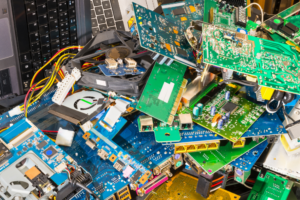 Even worse? A huge part of this waste is preventable and is driven by the concept of obsolescence. There are two types of obsolescence — planned and perceived. Planned obsolescence is where devices stop working properly after a period of time due to incompatibility with new updates or wear and tear on components that are designed so that they can’t be replaced.
Even worse? A huge part of this waste is preventable and is driven by the concept of obsolescence. There are two types of obsolescence — planned and perceived. Planned obsolescence is where devices stop working properly after a period of time due to incompatibility with new updates or wear and tear on components that are designed so that they can’t be replaced.
Perceived obsolescence is when we swap out our devices not because they no longer work, but because we want the newest version available. For instance, the average person gets a new smartphone every 2 years or so (other tech isn’t much better, at an average of 3-4 years), even though in most cases the older devices are perfectly functional and the new models have minimal changes.
There are two main ways we can all help reduce the amount of e-waste heading to our landfills each year:
- Wait as long as possible to replace your electronics. If they’re still functioning properly or can be repaired, hold off on buying a new one.
- When you do need to buy a new device, buy refurbished.
Buying refurbished helps reduce e-waste by keeping older electronics out of the landfill. Even better, when computers and other devices are refurbished, they are repaired to meet manufacturer standards and reconditioned to be nearly as good as new, giving old electronics a few more years of life.
Reduces Your Carbon Footprint
 In addition to polluting our environment and adding needless waste to our landfills, the manufacturing of new electronics uses a lot of energy. For instance, it’s estimated that 90% of the total energy impact of smartphones comes from their manufacturing and distribution. From mining core minerals to the manufacturing process to the transportation of components and finished products, a significant amount of energy is consumed just to get a device on the store shelf.
In addition to polluting our environment and adding needless waste to our landfills, the manufacturing of new electronics uses a lot of energy. For instance, it’s estimated that 90% of the total energy impact of smartphones comes from their manufacturing and distribution. From mining core minerals to the manufacturing process to the transportation of components and finished products, a significant amount of energy is consumed just to get a device on the store shelf.
Refurbished computers and other electronic devices reuse old parts, reducing the energy consumption needed to manufacture new ones. Because of this, the carbon footprint of these devices is significantly lower.
Looking To Buy Refurbished Electronics? Look No Further Than Comprenew
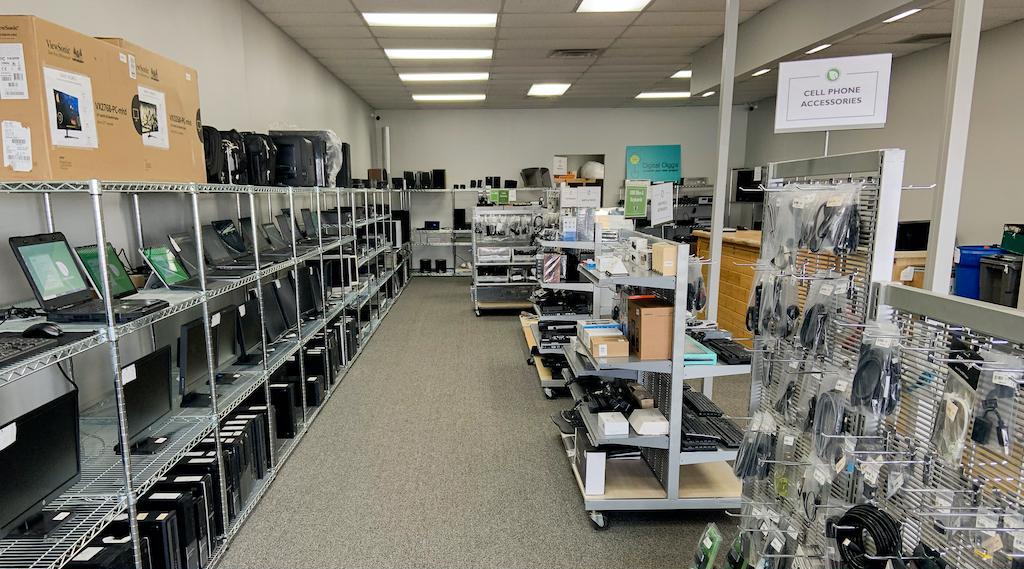
We offer a wide range of refurbished devices, including smartphones, computers, flat screen TVs, and more. Visit one of our retail locations or shop online to browse our selection of high-quality refurbished electronics.
If you’ve decided to close or downsize your office location, you’re definitely not alone. According to a survey taken in August 2021, 69% of U.S. businesses had permanently closed some or all of their offices since March 2020, and an additional 41% of businesses chose to downsize their office space.
The primary reason? A transition to remote or hybrid work. The same survey found that the top reason why businesses have permanently closed their office space over the past two years was because a majority of their employees wanted to work from home. Other businesses closed their office locations to save money or to protect employees’ health (due to the COVID-19 pandemic).
Regardless of why you’re closing or downsizing your office space, doing so likely leaves you with a lot of office equipment you’re not sure what to do with. We can help with that.
3 Ways Comprenew Can Help Make Closing or Downsizing Your Office Easier and Safer
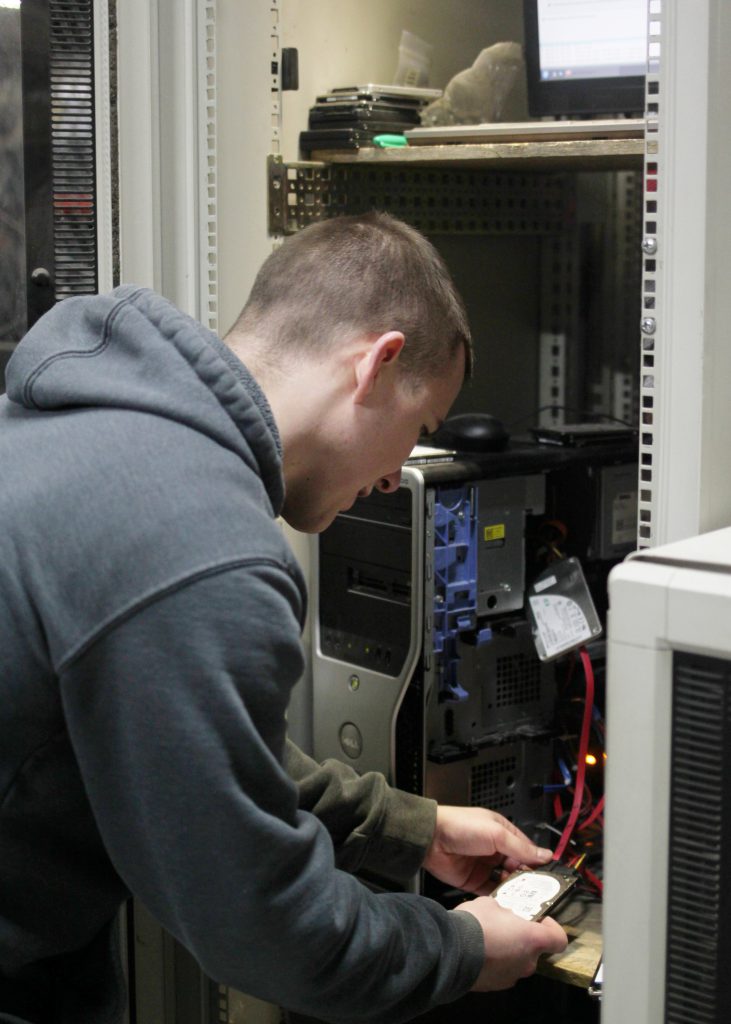 Comprenew can help with the safe disposition and decommissioning of your office IT equipment and assets in three ways:
Comprenew can help with the safe disposition and decommissioning of your office IT equipment and assets in three ways:
- IT Asset Disposition (ITAD). We help corporate clients manage the process of asset recovery while assuring ITAD-related data security and environmentally-safe asset disposition. Our ITAD services include collection of IT assets, a secure chain of custody, secure data destruction, and recycling, refurbishing, or redeploying IT assets, among other crucial services. We collaborate with each client to identify the specific ITAD services and processes they need. Learn more about our ITAD services here.
- IT Equipment Decommissioning. We offer several on-site services for added security and convenience, including mobile hard drive shredding, data device destruction, and data erasure. Our expert team also offers on-site decommissioning of server and network environments, telecommunications systems, and other IT infrastructure.
- Nationwide ITAD Pickup. We offer nationwide pickup of IT assets using our own trucking fleet and our network of vigorously vetted and certified electronics recycling partners. When you utilize this service, your assets are tracked upon acquisition and all cargo remains secured through and after arrival at our central processing facility. We offer both full truckload and less-than-truckload pickup options.
When you entrust your IT asset disposition or decommissioning to Comprenew, it frees you up to focus on the many other details involved in closing your office space. Plus, you can rest assured that your sensitive data is safe with us.
You Can Trust Comprenew With Your IT Assets and Sensitive Information
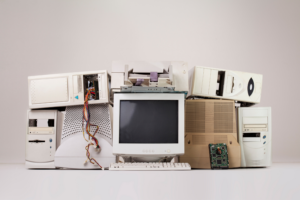
When disposing of IT equipment and assets that contain sensitive information, it’s important to ensure your data will be kept safe. Comprenew is certified to the highest possible standards in electronics recycling and data security. We are the only nonprofit in the world — and the only electronics recycler in Michigan — certified by both e-Stewards and R2. This means that your data is safe with us.
If you’re closing or downsizing your office, contact us to talk about how we can help make that transition easier, dispose of your unneeded IT assets, and keep your sensitive data safe.
We’re sure you know that recycling electronics is beneficial to the health of our planet…but did you know that it can also help you meet your business goals?
It’s true. Partnering with Comprenew can help you meet your bottom line initiatives in three areas: people, profit, and planet. Here’s how.
People: Your Corporate Social Responsibility Policy

What steps is your business taking towards inclusion, diversity, equity, community support, health and safety, and improving labor standards? Comprenew can help you meet your corporate social responsibility goals in these areas.
In addition to our electronics recycling work, Comprenew is a nonprofit that serves our community by helping to bridge the digital divide. We do this by offering affordable technology through our retail stores as well as helping those in need through the Connect All Michigan Program, or CAMP.
Through CAMP, we help provide free and reduced-cost computers to low-income students and families. When the pandemic began, we were thrilled to provide computers to students who didn’t have the technology they needed to participate in distance learning. And now, this program continues to help put low-income students and families on a more equal footing with their peers so they can continue to connect and learn.
If you are looking for ways to serve your community and meet your corporate social responsibility goals, here are a few ways you can get involved.
Profit: The Economic Value of Your Business

The economic value of your business is more than just having money in the bank (though that certainly doesn’t hurt).
When determining the value of your business, it’s important to also consider how you acquire profit, what kind of ROI you generate, how stable your business is, and what its long-term viability is. A partnership with Comprenew can boost your bottom line through secure and compliant IT asset disposition (ITAD) services.
No one wants to think that a data breach can happen to them, but unfortunately the number of data breaches that happen each year is on the rise. And a data breach can lead to brand reputation damage and revenue loss. Our ITAD services keep your business’ data safe and help you remain compliant with the highest in data security standards.
And if you’re looking to save money on computers, networking equipment, or other electronics for your business, we can help with that too. Contact us to learn more.
Planet: Your Environmental Stewardship Goals

What is your business doing to reduce its carbon footprint, move towards zero emissions, leverage renewable energy, and support biodiversity? Whatever your environmental stewardship goals are, Comprenew can help you meet them in four ways:
- Electronics recycling. Electronic waste (or e-waste) contains hazardous materials that, when allowed to sit in the landfill, contaminate our groundwater and atmosphere. This is why electronics recycling is so important. We accept nearly all electronics for recycling and handle all data-containing electronics using the leading data sanitization process in the industry.
- IT Asset Disposition (ITAD). With our ITAD services, your business can stay on top of changing technology while protecting the security of your data and keeping e-waste out of landfills.
- Equipment Refurbishment. Comprenew minimizes environmental impact by promoting reuse before recycling. Reuse extends the life cycle and value of electronics, reduces waste and manufacturing costs, and requires less energy than recycling.
- Donations. We accept donations of nearly any type of electronics for recycling or refurbishing. Learn more about making a donation here.
Partnering With Comprenew Helps You Meet Your Goals and Boost Your Bottom Line
Whether you’re looking to offer a greater contribution to your community, boost your company’s ROI, or reduce your carbon footprint, a partnership with Comprenew can help you get there. Contact us to talk about the ways we can help you reach your bottom line initiatives this year.
If you’re new to Comprenew Retail Stores, or to electronics recycling in general, you probably have questions. In the hopes of providing answers to at least some of those queries, here are the most common questions our store managers receive.
Where Are the Comprenew Retail Stores Located?
Our retail store locations and hours are as follows:
PLAINFIELD AVE STORE
4186 Plainfield Ave NE
Grand Rapids, MI 49525
616.226.6638
Monday-Saturday 10AM to 6PM
SHOWROOM
629 Ionia Ave SW
Grand Rapids, MI 49503
616.855.6262
Monday-Saturday 9AM to 5PM
Shop our online store at www.shopcomprenew.org
When Can I Drop Off Recycling? Do I Need an Appointment?
No appointments are necessary! Recycling can be dropped off at any time during our hours of operation at any of our locations. If you need help bringing items in from your vehicle, our staff will be happy to assist you.
Note: If you are dropping off a large quantity of recycling, or if you are a corporate business, please call 616-451-4400 for further information before coming by.
What Items Do You Accept for Recycling?
We accept nearly all electronics for recycling, including computers, hard drives and data devices, printers and scanners, TVs, air conditioners, microwaves, cell phones, batteries, and more.
For more information, view our recycling page, where you can also schedule a pickup if desired.
Do You Charge Fees To Recycle Electronics?
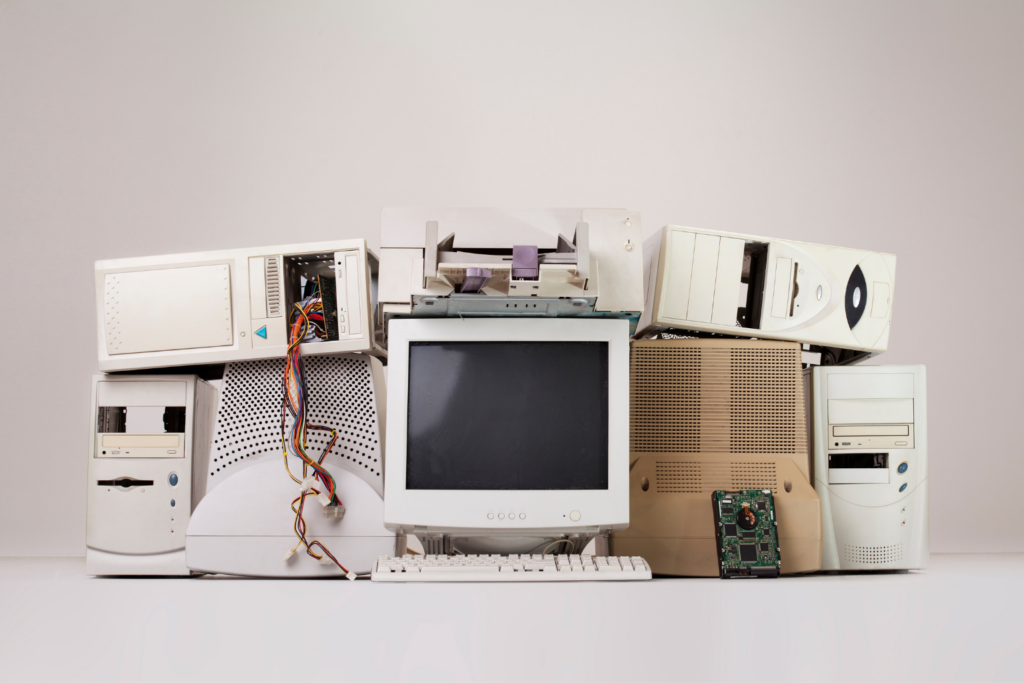
For some items, yes. We are able to recycle certain items free of charge, including cell phones, laptops, desktops, gaming consoles, and a few additional items. For other electronics, we do need to charge a recycling fee.
View our full list of electronics recycling fees here.
Do You Sell Any Items Other Than Computers?
Yes. Aside from computers and computer accessories, we sell:
- A/V products
- Vintage electronics
- Cables and chargers
- Video game consoles
- Printers
- Networking products
- Cell phones
- and more!
What Kinds of Electronics Do You Repair?
At the moment, we only repair computers. It’s possible we will offer other repair options in the future, but for now we are focusing our efforts on computers.
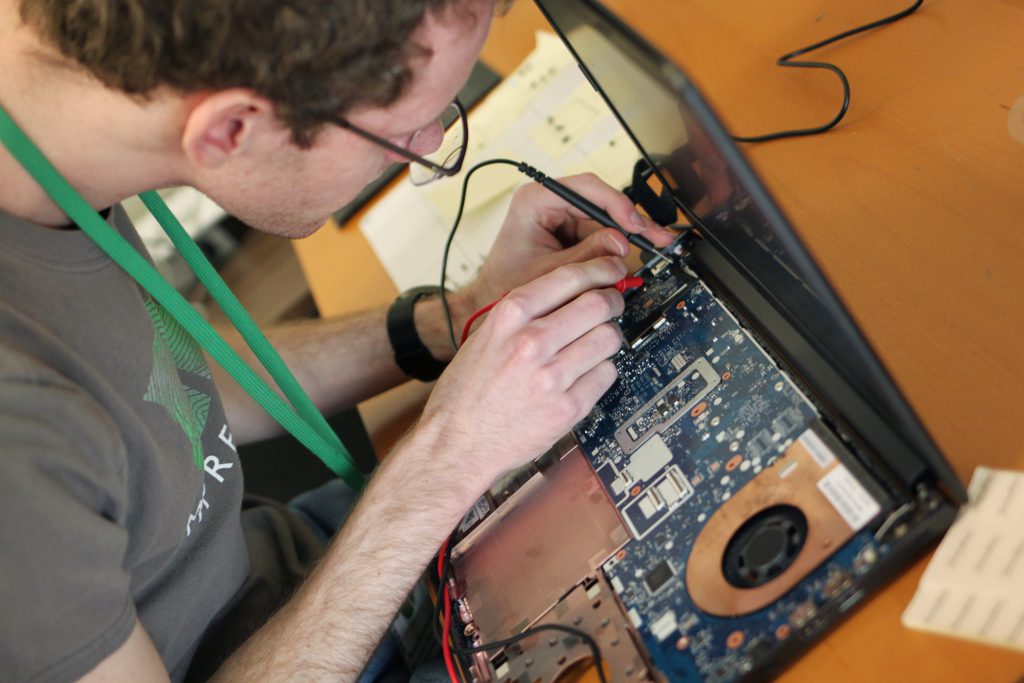
Do You Have Any Deals or Specials Available?
Since we sell refurbished products, our pricing on computers and electronics is already very competitive. However, we do occasionally feature sales or discounted products — follow along on our social media channels to stay up to date on any special offers:
Have Additional Questions? Just Ask!
If you have questions that we didn’t address here, feel free to contact us here or call or visit any of the Comprenew Retail Stores listed above, and we will be happy to help you.
If you’ve asked this question before, you’re not alone — it’s a common question in our industry.
Most IT asset disposition (ITAD) companies charge fees to businesses and individuals alike when recycling certain items. We understand that it might be frustrating to pay a fee to recycle electronics — especially if you are used to recycling other items for free or even getting paid for scrap items. It may help to understand the reasons behind the fees.
Why Electronics Recycling Is Important
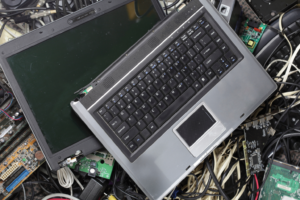 The electronics we use everyday contain hazardous materials like lead, mercury, cadmium, flame retardants, and more. Electronics recycling helps keep those hazardous materials out of landfills…and therefore out of our soil, air, and water.
The electronics we use everyday contain hazardous materials like lead, mercury, cadmium, flame retardants, and more. Electronics recycling helps keep those hazardous materials out of landfills…and therefore out of our soil, air, and water.
As product innovation continues to grow, electronic waste does as well. According to Global E-Waste Monitor 2020, a record 53.6 million metric tonnes of e-waste was generated worldwide in 2019. This is why proper electronics recycling is so important.
Reuse is an important part of reducing e-waste as well. Refurbishing electronics extends the lifecycle and value of electronics, reduces waste and manufacturing costs, requires less energy than recycling, and provides job opportunities. For these reasons, we prioritize reuse before recycling at Comprenew.
Bringing Your Electronics to a Certified Recycler Is a Must
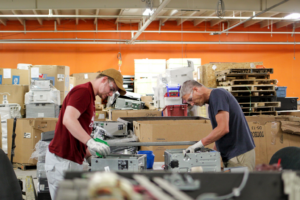 Unfortunately, the ITAD industry in the U.S. is largely unregulated. This can leave room for the improper disposal of toxic materials by some companies who claim to be electronics recyclers. It also means some recyclers have lax data security, leaving the door open for the theft of your sensitive information. Because of this, it’s crucial to choose an electronics recycler with the right certifications.
Unfortunately, the ITAD industry in the U.S. is largely unregulated. This can leave room for the improper disposal of toxic materials by some companies who claim to be electronics recyclers. It also means some recyclers have lax data security, leaving the door open for the theft of your sensitive information. Because of this, it’s crucial to choose an electronics recycler with the right certifications.
Certifications like R2 and e-Stewards indicate a recycler who is committed to properly recycling your electronics and protecting your sensitive data as they do so. R2, or Responsible Recycling, ensures that the company abides by certain standards, such as prioritizing refurbishment, properly destroying sensitive data, tracking equipment, and maintaining legal compliance and sufficient insurance.
An e-Stewards certification requires even more rigorous standards, such as managing toxic e-waste using the highest standards, avoiding the export of toxic e-waste to developing countries, and guaranteeing responsible downstream management of toxic waste.
Comprenew is proud to be both R2 and e-Stewards certified. We maintain the highest possible standards for recycling your electronics, ensuring both the security of your data and a reduced environmental impact.
Why We Need To Charge a Fee To Recycle Electronics
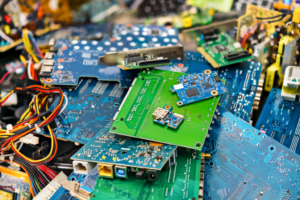 There are a number of costs involved in recycling your electronics, including:
There are a number of costs involved in recycling your electronics, including:
Equipment and labor costs. The equipment required to responsibly recycle electronics can be expensive. And the labor required to run those machines often constitutes the biggest cost for electronics recyclers and refurbishers.
The declining value of materials. Today’s electronics contain lower amounts of precious metals than those produced two or three decades ago. Previously, electronics recyclers could harvest those metals and sell them, which helped to offset the costs of recycling. Some plastics also used to be more valuable, and were easy to separate and sell. But now, with fewer options for recouping the costs of recycling, electronics recyclers are forced to pass those costs on to the consumer in the form of fees.
Certification fees. At Comprenew, we are certified to the highest international standards in electronics recycling. To obtain and maintain these certifications, we pay substantial fees. We pay for the initial certification and for both planned and unannounced audits.
Data security. The cost of proper data destruction can be steep. At Comprenew, we handle all data-bearing electronics securely, with the leading data sanitization processes in the industry. Every electronic device we receive is sanitized as standard protocol.
Hazardous material handling. As we mentioned previously, electronics contain several types of hazardous materials that, if not handled properly, can pollute our soil, water, and air. They can also be toxic to those handling them during recycling. It is vital to have the proper recycling equipment and techniques to handle these materials while protecting our people and the environment.
These and other factors all contribute to the costs we incur to properly and responsibly recycle certain electronic items. This is why, in many cases, we charge a fee to recycle electronics.
What Items Does Comprenew Accept for Recycling?
At Comprenew, we accept nearly all electronics for recycling. From office and household electronics to computer components and accessories, we accept any item with a cord or battery, except for large home appliances. You can view the full list of electronics we accept for recycling here. We accept electronics for recycling from companies or individuals, and we even offer item pickup services!
Contact us today to discuss your electronics recycling needs or to schedule a pickup.
Purchasing electronic equipment for your business can be overwhelming. Not only can the process be stressful—especially if you want to stay under budget—but it can also be filled with uncertainty: Which brand is best? Which supplier should I use? Will my warranty cover issues if any arise?
Fortunately, purchasing refurbished equipment diminishes these and other major concerns. In fact, there are a host of benefits to purchasing refurbished equipment for your business.
Let’s take a look at five of these benefits!
1.) Reduce your operating costs
 Regardless of the size of your business, you likely have a line item for IT equipment. Whether you’re purchasing equipment for one employee or 100 employees, staying under budget is a top priority if you want to operate your business profitably.
Regardless of the size of your business, you likely have a line item for IT equipment. Whether you’re purchasing equipment for one employee or 100 employees, staying under budget is a top priority if you want to operate your business profitably.
Enter refurbished electronics.
Whether it’s laptops, desktops, monitors, keyboards, servers, drives, etc. you can buy refurbished equipment for 30-50% less than new equipment (or more!). This helps you stretch the dollar while meeting your company’s hardware needs. Plus, buying refurbished allows you to supply your employees with a quality product with all the bells and whistles of a brand-new product at a fraction of the cost as opposed to buying a brand-new base model for the same price or higher. A win-win.
2.) Get more affordable equipment with the peace of mind that it’s been thoroughly inspected
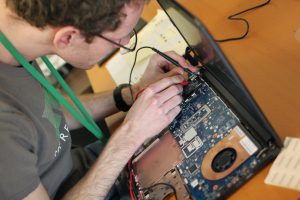
Oftentimes employers are hesitant to purchase refurbished equipment for their employees because they worry that it may be faulty or prone to issues. It’s important to understand that refurbished equipment from a trusted supplier undergoes thorough testing before it hits the shelves.
We make necessary repairs and fully inspect all the refurbished equipment in Comprenew’s retail stores so you know you’re always purchasing equipment you can count on.
3.) Receive a longer warranty
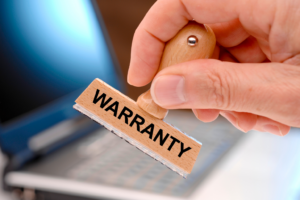 When it comes to making a purchase, a warranty will often sway your decision or, at minimum, increase consumer confidence. You know that, if something malfunctions, the seller or the manufacturer has your back.
When it comes to making a purchase, a warranty will often sway your decision or, at minimum, increase consumer confidence. You know that, if something malfunctions, the seller or the manufacturer has your back.
When you purchase brand-new electronic equipment, it comes with a warranty. This warranty is usually a 90-day to 1-year warranty.
But how does it work when you purchase refurbished equipment from a third-party vendor?
When you choose to purchase refurbished electronic equipment, in many cases you receive an equal or longer warranty! At Comprenew’s retail locations, we offer a free 30-day warranty with an optional extended 1-year warranty for just $29.
To reiterate…
When you buy refurbished equipment, you save on cost, you can get more features for your money, you have peace of mind that the equipment has been thoroughly inspected and any necessary repairs have been made AND you can get a warranty that matches or surpasses the warranty on brand-new equipment.
But there’s more! Here are a couple more ways you stand to gain by purchasing refurbished electronics…
4.) Have better access to replacement parts
When you purchase refurbished electronic equipment, replacement parts are typically much easier to obtain because the equipment is widely distributed and has been in circulation longer. You reduce the likelihood of waiting on a special order replacement part.
This is particularly important to consider given our current global supply chain crisis.
5.) Leave a smaller carbon footprint
 Ultimately, when you choose refurbished over brand-new electronics from a certified vendor, you make a positive environmental impact.
Ultimately, when you choose refurbished over brand-new electronics from a certified vendor, you make a positive environmental impact.
- You reduce the mining of valuable natural resources such as copper, silver, gold and nickel.
- You reduce air pollution by reducing the demand for manufacturing.
- You reduce carbon emissions resulting from transport.
- You reduce waste by keeping retired assets out of landfills.
If you’re interested in purchasing refurbished electronic equipment for your business, we’d love to speak with you! Give us a call or email us here to learn more.
The IT asset disposition industry is largely unregulated in the U.S. This probably sets off some alarms…or at least it should. When businesses and consumers hand over end-of-life electronic assets, they hand over sensitive data as well. No one wants their personal data exposed, making them susceptible to fraud. What’s more, businesses are legally obligated to make sure all customer data such as credit card information and personal identification information is thoroughly destroyed.
But where are the checks and balances that ensure a tight chain of custody? And how can you be sure your vendor is disposing of your electronics in an environmentally responsible manner?
Risks of using a recycler that is not certified
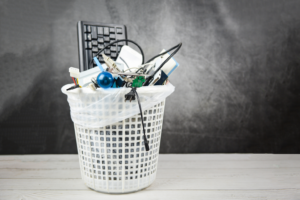 Sadly, many vendors simply view e-waste as trash and treat it as such. They don’t worry about a tight chain of custody to protect proprietary or customer information and they don’t take precautions to keep toxic materials out of landfills or to protect their workers who interact with those materials. Refurbishing equipment isn’t a high priority for them which increases the amount of e-waste they generate.
Sadly, many vendors simply view e-waste as trash and treat it as such. They don’t worry about a tight chain of custody to protect proprietary or customer information and they don’t take precautions to keep toxic materials out of landfills or to protect their workers who interact with those materials. Refurbishing equipment isn’t a high priority for them which increases the amount of e-waste they generate.
In this all-too-common scenario, bad actors can easily take advantage of the laissez-faire mentality and weak chain of custody and steal sensitive information, resulting in hefty fines and a tarnished reputation that many individuals and businesses never recover from.
Worst case scenario, this can mean lose-lose-lose for you, the vendor and their employees and the environment.
So what can be done?
R2 and e-Stewards enter stage left.
What is R2 certification?
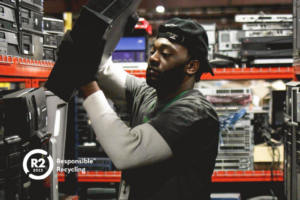 The “wild west” nature of the electronics recycling industry prompted Sustainable Electronics Recycling International (SERI) to create an environmental standard known as Responsible Recycling or R2.
The “wild west” nature of the electronics recycling industry prompted Sustainable Electronics Recycling International (SERI) to create an environmental standard known as Responsible Recycling or R2.
This standard was created with guidance from the EPA, state agency regulators, electronics recyclers and refurbishers, OEMs, customers and other organizations not affiliated with the government.
Among other things, R2 certification ensures that vendors:
- Prioritize electronics refurbishment whenever possible
- Properly destroy all sensitive data
- Monitor workplace health and safety
- Maintain legal compliance
- Carefully track all equipment
- Maintain sufficient insurance to cover operations
What is e-Stewards certification?
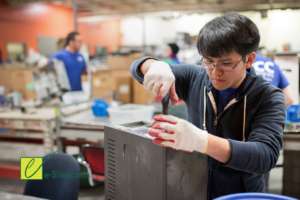 While the R2 certification is a step in the right direction, e-Stewards is even more rigorous in its standards and encompasses the R2 practices. With a heavy emphasis on environmental protection, e-Stewards prohibits the disposal of toxic e-waste in landfills and incinerators and confirms that the import and export of electronic devices meet the highest international hazardous waste standards.
While the R2 certification is a step in the right direction, e-Stewards is even more rigorous in its standards and encompasses the R2 practices. With a heavy emphasis on environmental protection, e-Stewards prohibits the disposal of toxic e-waste in landfills and incinerators and confirms that the import and export of electronic devices meet the highest international hazardous waste standards.
Among other things, e-Stewards certification ensures that vendors:
- Properly destroy all sensitive data
- Operate with a tight chain of custody
- Manage toxic e-waste by the highest standards to protect workers and the environment
- Guarantee responsible downstream management of toxic materials
- Utilize ethical labor
- Avoid exporting toxic e-waste to developing countries
Greenpeace, the Sierra Club and the Natural Resource Defense Council all endorse e-Stewards as the highest industry standard for environmental protection.
Becoming R2 and e-Stewards certified
ITAD vendors who choose to get R2 and e-Stewards-certified pay a substantial fee and undergo rigorous annual audits of their operations. These certifications give clients peace of mind that they are working with a trusted vendor who responsibly handles their data and materials.
Did you know that Comprenew is the only nonprofit e-waste recycler in the world that holds both R2 and e-Stewards certifications? That’s right. We want our customers to have the full assurance that, when they work with us, their data is secure and they are disposing of their end-of-life assets in a way that reduces their environmental impact as much as absolutely possible.
In fact, we refurbish any electronics we can, promoting reuse before recycling.
Contact us today to discuss your ITAD needs for your school, business or organization!
The Environmental Protection Agency (EPA) estimates that 25 percent of the United States’ electronic waste is exported and dumped, rather than being properly recycled. As a result, impoverished regions across Asia and Africa are faced with detrimental environmental and public health consequences. While some devices may be salvageable for reuse, many are burned or buried in large e-waste dumps.
This poses a serious data security risk to both individuals and organizations using recyclers and refurbishers that are not adhering to a strict zero-export policy for electronic waste. In 1989, the United Nations Basel Convention restricted the international trade of hazardous waste to prevent pollution dumping on the world’s poorest residents. Despite this effort, many U.S. recyclers still ship some portion of their material overseas, or they are unaware that their downstream channels are doing so. In fact, recently a large investment banking firm found themselves in a precarious situation when they learned that customer data was compromised on decommissioned hardware that was improperly handled.
This is why in 2015 Comprenew chose to become certified to the e-Stewards standard, in addition to the R2 standard which was earned in 2014. This certification requires that we follow a strict chain-of-custody for all electronic material sent to downstream vendors. Data-bearing devices are wiped or shredded in a secure area upon arrival at Comprenew, and we always prioritize extending the lifecycle of a device and promote reuse whenever possible. This reduces waste and manufacturing costs, requires less energy, and provides job opportunities to people in our community.
Comprenew is the only nonprofit in the world certified to both the e-Stewards and R2 standard, making us an industry leader in proper electronics lifecycle management, data security, and environmental health and safety. For more information, please visit comprenew.org.
